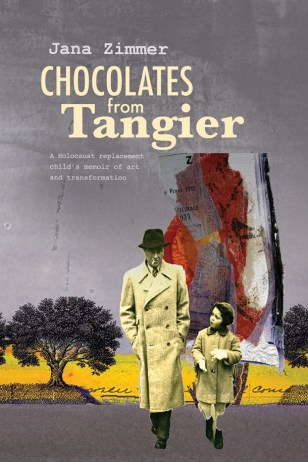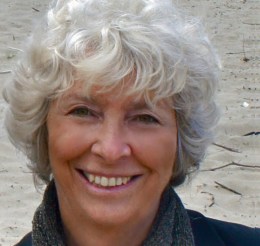Weaving Art and Memoir
Jana Zimmer Talks About ‘Chocolates from Tangier’

Attorney and former Coastal Commissioner Jana Zimmer has been making art since 1995. In addition to Chocolates from Tangier, she has published two previous books, Collaboration, with Portland textile artist Sharon Marcus, and Navigating the California Coastal Act, the first “coffee-table law book,” which includes her digital collage as commentary.
Toward the beginning of your new book, Chocolates from Tangier, you quote French neuropsychiatrist and child survivor Boris Cyrulnik, who wrote: “Two great dangers threaten the children of the Shoah. The first is to speak about it; the second is not to speak about it.” Can you talk about why you decided on “not letting go, but holding on, and continuing to remember”? The truth is I never believed I had the option to forget and move on, morally, ethically, or as a matter of personal psychology. I thought I had completed what was needed after I took my art to Prague and the Terezín ghetto in 2006. Honoring my father’s experience was at the heart of that. I thought I was done, again, in 2015, when I exhibited in Germany, where my mother had been a slave laborer. But in the last few years, it has become clear that even if my personal journey in relation to this subject feels complete, my duty continues because Holocaust denial continues, racism continues, anti-Semitism continues, and is becoming frankly more terrifying. So, letting go serves the haters.
Considering its subject matter, readers might be surprised to find that Chocolates from Tangier is a strikingly beautiful book, packed with full-color reproductions of your art, as well as photographs of objects and documents. And, appropriately, the book is multi-voiced, featuring writing by your mother and father, your earlier self, and a number of well-chosen quotations. The book’s form came about organically on its own calendar. I’ve been moving back and forth between word and image, between my father’s and my mother’s stories, addressing them in my art, and in my writing, my poetry, even in my legal work, for 40 years. I’m now finally beginning to address my place between them.
You write that you have “an instinct that some elements of the spiritual and emotional memory of the six million can be found in the arrangement of the components of a piece of art and in the spaces between.” How do your artistic specialties of collage and printmaking reflect the traumas of the Shoah? Jiří Kolář, a Czech poet and collage artist, said it all: “The world attacks us directly, tears us apart through the experience of the most incredible events, and assembles and reassembles us again. Collage is the most appropriate medium to illustrate this reality.” I also have found that printmaking, creating repetitions, multiples, and variations of the same image — and I include here digital prints — offered me useful tools to signify the unfathomable numbers, both the enormity and the specificity of our losses.

You mention the Yiddish saying Schwer ist, a Yid zu sein — “It’s hard to be a Jew.” That’s obviously there in the horrors of the Holocaust, but as you describe all the challenges your parents faced, and your own journey from Prague to Montreal to San Diego and finally to Santa Barbara, I also had the feeling that being Jewish was … I know “ennobling” is the wrong word. I don’t subscribe to the notion of “Jewish exceptionalism,” so I am uncomfortable with the word “ennobling,” or the idea that suffering can be ennobling, at all. I’m more inclined toward simple, Eastern European Jewish philosophy: “If the Jews are God’s ‘Chosen People,’ please, tell them to choose someone else.” I’d trade a few Nobel Laureates for a world where my grandchildren can live safely as Jews. After reading this book, what I hope people might feel is one word: compassion. Not for my parents, or “the six million,” or even for me. For each other. I want their hearts to break open.
Jana Zimmer will do a book-signing at Chaucer’s Books (3321 State St.) on Thursday, January 19, at 6 p.m.
Support the Santa Barbara Independent through a long-term or a single contribution.




You must be logged in to post a comment.